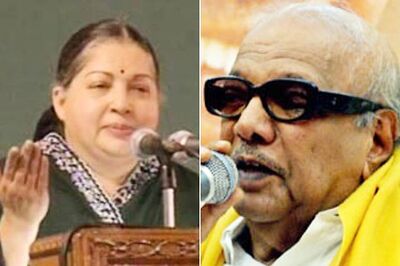
views
The Delhi High Court is scheduled to hear on Monday Delhi Transport Minister Kailash Gahlot’s plea challenging a provision which requires state government ministers, including the chief minister, to seek political clearances from the Centre for foreign visits.
The petition was filed in the backdrop of the recent denial of permission to Delhi Chief Minister Arvind Kejriwal for his visit to Singapore to attend the 8th World Cities’ Summit from July 31 to August 7.
Justice Yashwant Varma had earlier asked the petitioner to file an additional affidavit to buttress one of the reliefs claimed in the petition relating to permission for personal foreign visits. The petition said this was not the first instance of such abuse of discretion and mentioned that the chief minister was previously denied permission to attend the C-40 World Mayors’ Summit in Copenhagen in 2019. It said even Gahlot had requested for clearance to visit London at the invitation of Transport for London but there was no response from the authorities concerned in the central government till the time the request became infructuous.
Gahlot, an Aam Aadmi Party (AAP) leader, has sought issuance of guidelines to channel and guide the implementation of several Office Memoranda issued by the Cabinet Secretariat, empowering the Centre to grant or deny permission to state government ministers for foreign visits in their official capacity.
The minister, in his plea, said these visits were by invitation and were crucial fora for exchanging ideas on improving urban governance and showcasing Delhi’s own progress in urban design, and claimed the “draconian” manner in which the central authorities used their discretion on travel clearances is only exacerbated further by the fact that even personal visits by state government ministers must be cleared by them.
The petition sought quashing of the office memoranda (OM) to the extent that they require state government ministers to seek political clearances from the respondents for personal visits abroad. The petition has arrayed the Lieutenant Governor of Delhi, Union of India through ministries of External Affairs, Finance, Home Affairs and Prime Minister’s Office as parties.
It also sought quashing of the undated letter sent by the LG to the Delhi government on July 20, advising against the chief minister’s visit to Singapore. It said, as per one of the OMs issued by the Cabinet Secretariat, clearances are required from the Department of Expenditure in the Ministry of Finance, the Ministry of Home Affairs, the Ministry of External Affairs and the relevant Central Administrative Ministry, and once these clearances have been obtained, for visits involving a chief minister, a final approval from the PMO is required.
The whimsical and capricious manner in which travel clearances for Indian statespersons are treated is prejudicial not just to the interests of good urban governance in this case, but also national interests in global platforms generally. “Not only has the respondent no. 1 (LG) acted beyond his jurisdiction in advising against the Singapore visit, but the actual exercise of the powers conferred by the Office Memoranda above noted has been manifestly arbitrary and reflects unchanneled and unbridled use of discretion on part of the respondents, the plea said. It said there appears to be no prima facie reason or basis for denial of clearances for this particular visit to Singapore, making the action of the authorities manifestly arbitrary and without any evident discernible principle.
Such arbitrary and whimsical denial of travel permissions to important constitutional functionaries is a routine matter, and is often achieved either by prima facie illogical decisions or simply by delayed decision-making serving as a pocket veto, it claimed. The plea sought the court’s intervention for quashing the regime of clearances for private visits of state government ministers, and for framing the guidelines to channel the manner in which discretion is exercised by the Centre in the matter of granting travel clearances. Any discretion enjoyed by the respondents to deny State functionaries the permission to travel abroad for private reasons, on grounds of ‘political clearance’, is per se an unconstitutional infringement of the right to privacy protected under Article 21 of the Constitution as well as the dignity of the constitutional office held by the functionaries, it said.
As for official visits abroad by State constitutional functionaries, the current practice makes it evident that the discretion is guided, not by concerns of national interest and international diplomatic engagement, but by partisanship and electoral considerations. Such practice is enabled by the complete lack of judicial or legislative stipulation of the policy underlying such discretion, or of the procedures required to be followed in exercising it, it said.
Read all the Latest News India and Breaking News here




















Comments
0 comment